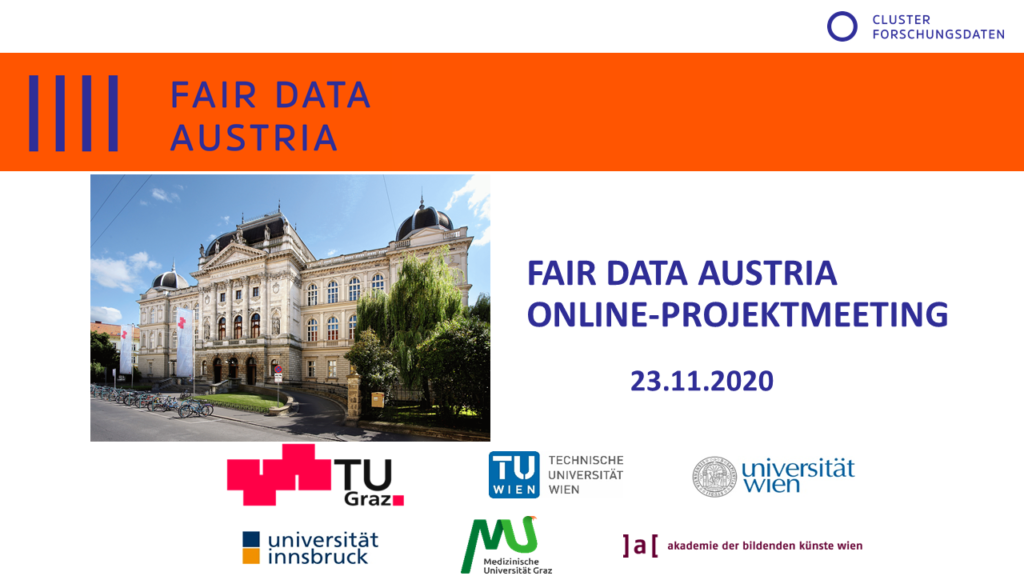On November 23, 2020, an online project meeting (via WebEx) was held, first, to inform members of the Cluster Forschungsdaten, associated partners and all researchers and support staff at Austrian universities about the main aspects and recent results of the project (in an open session for public) and second, to discuss with project and cluster team members the current status of the project and further course of action (in a closed session).
Key facts
Date: 23.11.2020
Location: Online (WebEx)
First part: 10:00 – 12:30
Second part: 13:30 – 16:00
Participant: 70 persons from 30 various Austrian institutions, universities, research and funding organizations
Organizer: Project lead and Handlungsfeld Forschung of the Digital TU Graz
Ilire Hasani-Mavriqi
Tony Ross-Hellauer
Sarah Stryeck
Elisabeth Rieger
Summary part 1
After a short welcome by Ilire Hasani-Mavriqi, Tony Ross-Hellauer and Elisabeth Rieger, a short presentation of the digitalization project at TU Graz by Vice Rector for Digitalization Claudia von der Linden followed.
Ilire Hasani-Mavriqi then gave an overview of the FAIR Data Austria (FDA) project. Before the event, participants were asked to answer the question “What do you associate with the FDA project?” in a slido survey. The result of this survey was given back to the participants in the form of a word cloud.
After this introduction, different presentations were given on different technologies:
- Tomasz Miksza presented the developments in the field of maDMPs and also gave an outlook on the next steps.
- In the presentation on Next Generation repositories, given by Maximilian Moser, the further development of invenioRDM together with CERN was presented. Christoph Ladurner then reported on how connections to PURE and to maDMPs can be established. The first tests with invenioRDM are scheduled to start in mid-January 2021. Interesting developments were also shown in the presentation by Andreas Rauber, who described the possibilities of using repositories in combination with databases.
- On the topic of RDM training and support, Susanne Blumesberger reported in detail on the current status, further planned developments and challenges. In addition, Tereza Kalová presented the training of data stewards in particular. Ilire Hasani-Mavriqi provided a general overview of data stewardship. Finally, Eva-Maria Asamer informed about the information hub FAIR Office Austria.
- In the last session, Heike Thöricht, Andreas Ferus and Peter Schaffer then shared their views on Deployment & Rollout in their area.
Finally, a two-question survey was conducted via Slido with the following questions, aiming to engage interested participants in the project:
- What topics discussed today are of interest to you?
- What kind of participation/communication is desired?
The feedback from the participants was positive throughout. The majority found the event very informative and well organized. Many stated that they had obtained a good overview of the project results.
Summary Part 2
In the second part, three breakout rooms were set up at the beginning, where the WP leaders (Room 1: maDMPs (Tomasz); Room 2: WP 3 (Ilire); Room 3: WP 5 (Tereza)) were to work out the lessons learned and the current status. The aim of the discussion within the work packages was, on the one hand, to discuss open questions, and on the other hand, to agree on goals to be achieved or which goals are achievable, but also on what cannot be achieved within the framework of the respective APs. After 30 minutes of group work, the results were presented and discussed in plenary.
Finally, in a concluding feedback round, cooperation, communication and organization were discussed and a few suggestions for improvement were made.


